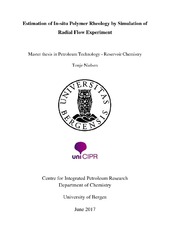| dc.description.abstract | Most experiments about in-situ rheology of polymer flow in porous media presented in literature is executed on linear cores and hence, performed during steady state conditions where the pressure drop is constant over the entire core. In field applications, the differential pressure is under an unsteady state pressure regime where the flow velocities decrease with increasing radial distance from the well. The conditions experienced during field application is better replicated by performing experimentsin radial cores, thus radial flow [1]. By executing polymer flooding in radial cores, a better estimation of the in-situ polymer rheology can be obtained and further, a better estimation of the injectivity. Furthermore, due to the viscoelastic behavior of synthetic polymers and the elongational flow caused by the porous media, the viscosity measurements obtained in viscometers deviates from the apparent in-situ polymer rheology. This consequently causes great uncertainties related to the performance of a polymer flood, which establishes the need to study in-situ polymer rheology. The thesis is a simulation study carried out at the Centre for Integrated Petroleum Research (CIPR) and the objective was to estimate the in-situ polymer rheology by history matching experimental differential pressure and further study the influence of polymer rheology on injectivity. The base of the following simulation study was experimental data obtained by performing both waterflooding and polymer flooding in a radial Bentheimer disk. The estimation of the in-situ polymer rheology was obtained by both manual and automatic history matching. Two simulators were used, STARS by CMG and MRST by SINTEF with an Ensemble Kalman Filter (EnKF) module developed by the University of Bergen. A sensitivity analysis performed in STARS investigated how altering various parameters and keywords in the script influenced the stabilized differential pressure and the results verified the script used for history matching manually in STARS. The results obtained by history matching in both simulators was consistent and only displayed minor deviations between the estimated output rheology. The results displayed a dominant shear thickening behavior when subjected to high injection rates and is attributed to the viscoelastic nature of synthetic polymers. This is consistent with literature on both linear and radial cores. Both shear thickening and shear thinning were observed at lowered injection rates and although shear thinning is known to be observed in viscometers, the apparent shear thinning behavior in porous media is more widely discussed in literature. Furthermore, the in-situ polymer rheology appeared rate-dependent and the effect was attributed to the viscoelastic nature of synthetic polymers which causes the apparent viscosity to depend on previous shear degradation. The degree of shear thickening and the estimated in-situ polymer rheology influences the injectivity and consequently the economics of the flooding project. An overestimated shear thickening, which is reported to be obtained in linear cores [1], consequently leads to an underestimated injectivity and an possible rejection of polymer flooding as an adequate EOR application. By estimating the in-situ rheology under similar pretenses as field conditions, this could possibly be avoided. | en_US |
